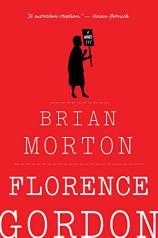Florence Gordon
Review
Florence Gordon
Brian Morton has given Florence Gordon, a New York feminist essayist who has just turned 75, high credibility in a sharply written novel about her son Daniel and his wife Janine, a granddaughter Emily, some remarkable long-term friends, and her own mortality. I stopped marking the pages to which I wanted to return around page 35 in FLORENCE GORDON. It would have been a dog-eared mess had I continued.
Florence had the good fortune to be a young woman in the ’60s (“bliss was it in that dawn to be alive”). She saw the Beatles come to America and was present at the discovery of sex and the dawn of liberation. Even if she ended up a cranky old lady proud to have been an activist, she reasons, there will always be something in her soul that remains green. She was also a complete pain in the neck.
Florence is currently writing around writing her memoir and wrestles with whether or not it is instead time to say something new. She looks back at notes from years ago when she had flirted with a topic: A Vindication of the Rights of Woman meets Das Kapital. She spends some time reconsidering but realizes again (the reason she had put the project aside before) that “she was a guerrilla fighter, a saboteur, a master of the sneak attack.” She wasn’t a grand system builder. She throws away the box of notes with a tremendous sense of satisfaction. “She didn’t want to change her life. She wanted to keep going.”
"I stopped marking the pages to which I wanted to return around page 35 in FLORENCE GORDON. It would have been a dog-eared mess had I continued."
Florence’s career takes a distinctive, breathtaking lift upward after a New York Times book review praises her work as brilliant and Florence as “a national treasure” and “an unsung heroine of American intellectual life.” This boost changes little in her exterior life beyond going on book tours and contending with her ex-husband’s jealousy. This moment in the limelight hadn’t been disappointing, vexing or complicated in any way: “It had been that rare thing: an unmixed pleasure.” Her moments of elation are tangible.
Vanessa and Florence have been friends for more than 40 years. They and three others were a study group that outgrew the term consciousness-raising and are now a tribe. They meet together after a conference where Florence was meant to be honored, but instead was insulted by an upstart young woman. This evening, the group of women includes Emily, the granddaughter, who closely watches. They were outraged first by the public insult and then by Obama’s lassitude in pushing healthcare, the Tea Party and the Supreme Court. Vanessa asks Emily what she was thinking about so furiously.
“I was thinking I’m amazed by the energy you all have. I was thinking I admire the way you can still get so indignant.”
“It keeps us young,” Vanessa said.
The youthful indignation about the injustices of threats to affirmative action, for one of many examples, continues among the group’s members, but it is disconcerting to Emily to see that her grandmother for the first time is not angry. She looks defeated.
Although the center of the novel remains Florence, the supporting cast is brilliant in moments of decision-making, regret and passion. Janine, who has been overly devoted to Florence’s intellectual life, has given her husband reason to doubt her fidelity. In a surprise move on his part, he has grabbed the moment and offered to drive her to a conference out of the city. She is not sure whether or not he knows of her maybe-affair. “On the spot Janine invented a theory that there isn’t a wife in the world who doesn’t, in some tiny spot of her consciousness, carry the fear that her husband might murder her someday.” And her husband’s face --- eager, intense elation --- was what she would carry to her grave should her fear ever come true.
On one of her book tours in Boston, Florence trips out of a car in a rush to get away from an overbearing, silly woman who has awkwardly suggested that Florence and her work might be forgotten. Florence sprains her ankle and must use a cane for some days. However, after a healing period, she realizes that her left ankle is still not functioning properly; it is as if it doesn’t want to come along. Her doctor, Noah, runs tests and has her return to his office for consultation. His first medical advice is not to go on the Internet because you can make yourself crazy with all the bad things, which are unlikely and exotic. He knows he’s given this advice before, but it’s worth repeating: If a good doctor hears a hoof beat, he thinks it’s probably a horse, not a zebra. One of the pieces of the novel is diagnostic: figuring out the horses and the zebras in Florence’s life.
FLORENCE GORDON is insightful and fresh. And it’s not just for 70+ women. Brian Morton reveals how all humans reach, miss marks, recalibrate, hit some, and continue to make relevant lives. Please get this book. I would lend you mine, of course, but you’ll want to mark your own copy.
Reviewed by Jane Krebs on September 26, 2014
Florence Gordon
- Publication Date: September 1, 2015
- Genres: Fiction
- Paperback: 320 pages
- Publisher: Mariner Books
- ISBN-10: 0544570243
- ISBN-13: 9780544570245




